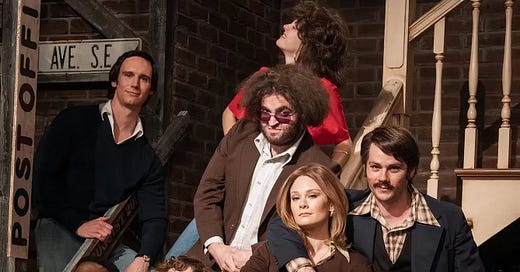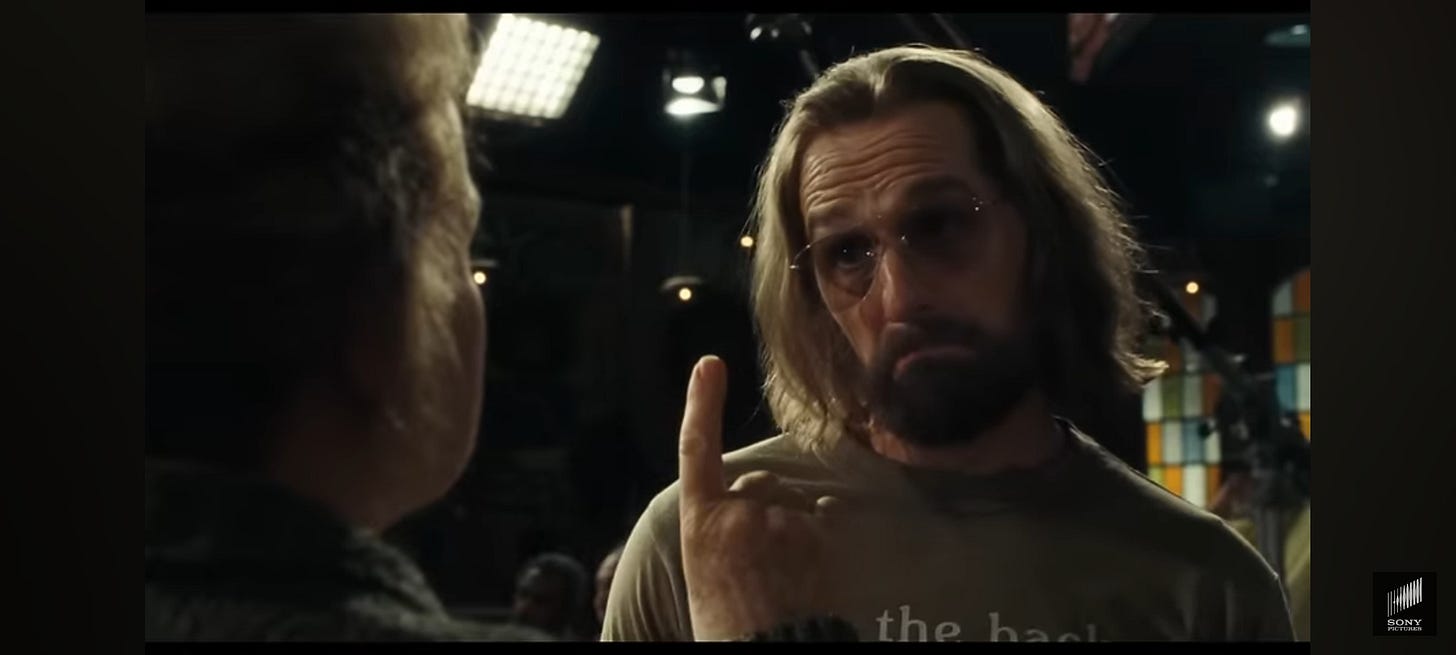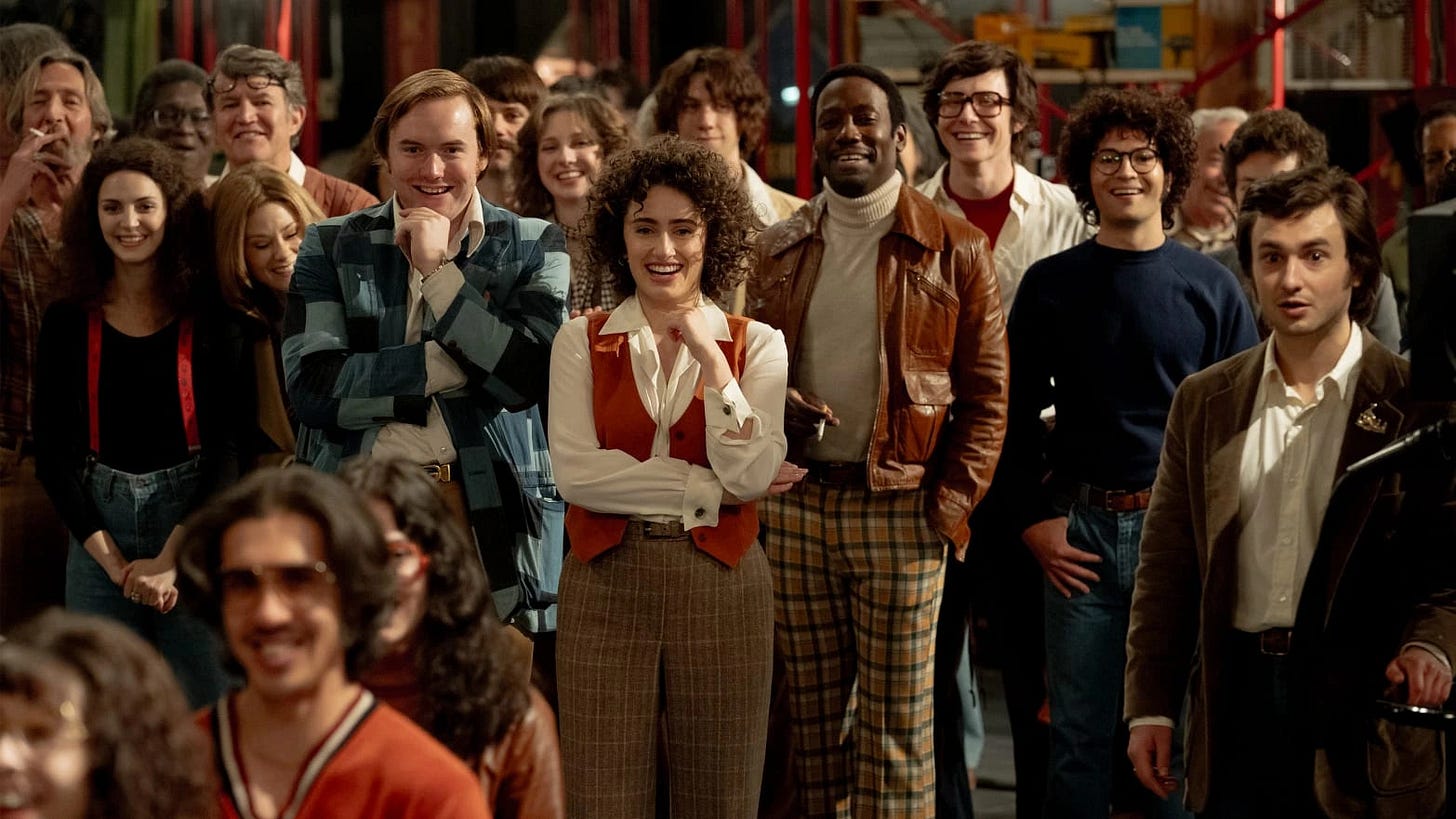‘Saturday Night’ and The Moron Line
This pretty good film about the chaotic runup to one of the most iconic series launches in history gives in to distrust of its audience only a handful of times, but they sting.
NEW STANDARD DISCLAIMER: This newsletter aggressively spoils things.
Saturday Night Live has been on the air almost as long as I’ve been alive, and certainly as long as I can actually remember1. By the time I was old enough to actually take an interest it’s initial golden age was long gone, but it’s shifted back and forth between shitty and brilliant so many times it doesn’t even matter any more: It’s just part of the pop cultural matrix at this point, a fixture2.
Of course, back in 1975 it wasn’t anything at all—just a scrappy group of young comedians doing some counter culture-adjacent comedy with a fluke shot at network television3. Jason Reitman’s Saturday Night is all about the hour and half before the first episode aired, showing the (mostly) true story of how that particular sausage got made (spoiler alert: Barely). It’s filmed in a frenetic series of long shots, mostly following a young and extremely anxious Lorne Michaels (Gabriel LaBelle) as he frantically tries to figure out what, exactly, his show is as disaster hovers everywhere in various forms4.
It’s mostly successful. Reitman captures the jittery energy5 and youthful camaraderie of the cast, the chaos of throwing together a vaguely-defined show written by one of comedy’s greatest provocateurs (Michael O'Donoghue, played by Tommy Dewey), and the cast of (mostly) unknowns are good physical and voice matches for their famous avatars. The only mistake the film makes is a subtle one: It does a perfectly good job of showing us the attitude that the network executives had toward Michaels and his show. But it doesn’t trust us, so it stoops to telling us as well. Several times.
I Would Rather Butt Fuck Cancer Than Make These Changes
The main thing writers Reitman and Gil Kenan want you to know about Saturday Night Live is that no one at the network wanted it to succeed. It’s presence was a fluke of contract negotiations with Johnny Carson, and no one expected it to last very long, much less be a hit—the decision whether to actually go live or go with a rerun of The Tonight Show was left to the very last second6.
They want you to know this so badly they have people tell you several times in the most awkward way possible. Characters literally say “they don't even want it!” just to make sure we get the point that this show that is now a cultural mainstay in a world where pop culture changes every few years was once considered a mangy afterthought.
Which, fine. Maybe people actually said these things, and it’s fine. Except the film gives us a perfect example of how this information can be effectively shown. It’s right there in the script!
Your Reputation Precedes You. Yeah, By About 11 Inches
1975 was a weird moment—far enough away from the 1960s to leave a sour aftertaste in people’s mouths, far enough away from the 1980s to seem like a foreign country. One great way Saturday Night underscores this is with the presence of Milton Berle. Sure, Milton Berle was probably actually there, but in the film he acts as a signal that the Not Ready for Prime Time Players were outliers, because Berle was still a huge star in 19757. He would famously trainwreck the show when he co-hosted in 1979 and was banned for life by Michaels, but in 1975 Berle had little reason to give a shit about the show.
Simmons, as Berle, makes this exquisitely clear as he swans about in a tuxedo, dispersing insults and contempt in equal measure8. Berle’s complete disinterest in anything but the younger female cast members makes it very clear that the still-ascendant old guard at NBC considered Saturday Night to be a momentary aberration, not a consequential cultural shift9.
This is echoed by the voice of Johnny Carson (Jeff Witzke), who calls Michaels to do some passive-aggressive posturing just before airtime. It’s clear that Carson isn’t threatened in the least—he even ends the call by pompously telling Michaels that he’s heard he’s a good writer and he should send him some work10. Carson clearly regards SNL as a one-time oddity, but he doesn’t have to explicitly say it.
The writing dictum of “show don’t tell” isn’t a rule, per se, or even a necessary concept to worry about—but it is useful, sometimes, when analyzing writing. Saturday Night didn’t need to make the presumed failure of the show explicit. It did so because it didn’t trust its audience to pick up on its very, very obvious statements, so it implemented some Moron Line writing, which is always designed to make sure the dumbest people in the audience get what’s happening11.
Not every writer can leave their point to the literal last sentence of their essay, but then, I am not most writers.
NEXT WEEK: Severance masters the art of the vibe.
If you enjoy this newsletter, consider subscribing to my paid fiction Substack, Writing Without Rules: From the Notebook!
To be fair, my memory only extends backwards by about two weeks. Anything earlier than that is just an impression. Sometimes I read a journal or email from a few years ago and it’s like I’ve stumbled on a stranger’s secret thoughts.
Sort of like me at my local bar. I add nothing to the ambiance, but I’ve been there so long no one knows how to get rid of me.
One assumes most of the actors were given a single direction: Act like you’ve just snorted the best cocaine in the world.
The more you read about the SNL-era comedians the more you wonder how anything got made or put on the air, considering how stoned they all were at all times. Then again, I write entire novels while steadily draining the Scotch supplies of North America, so I should stop typing now.
Again: Cocaine.
I remember being absolutely mystified by The Tonight Show when I was a kid. It was shaped like entertainment, but I was never actually entertained.
Milton Berle seems like the sort of thing a poorly-programmed simulation would insert into our brains. Everything about the man seems impossible, including his apparently elephantine penis.
Honestly, J.K. Simmons might be the greatest actor of our times. What can’t the man do?
There’s really nothing lazier than doing a period piece where everyone fails to sense the times are a-changing. Having someone say “guitar bands are just a fad” about The Beatles isn’t as clever as you think it is, writers.
As a professional writer of sorts, let me tell you: No writer believes you when you say shit like this.
Usually, that’s me! So I enjoy these moments when it’s not. Unless I am too dumb to know how dumb I am.






